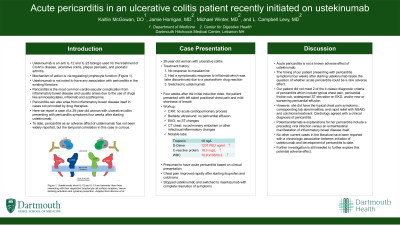Sunday Poster Session
Category: IBD
P0993 - Acute Pericarditis in a Patient With Ulcerative Colitis Recently Initiated on Ustekinumab
Sunday, October 27, 2024
3:30 PM - 7:00 PM ET
Location: Exhibit Hall E

Has Audio

Kaitlin McGowan, DO
Dartmouth Hitchcock
Lebanon, NH
Presenting Author(s)
Kaitlin McGowan, DO1, Jamie Horrigan, MD2, Michael Winter, MD2, L. Campbell Levy, MD2
1Dartmouth Hitchcock, Lebanon, NH; 2Dartmouth Hitchcock Medical Center, Lebanon, NH
Introduction: Acute pericarditis occurs uncommonly in patients with inflammatory bowel disease (IBD) and can be drug-induced, less commonly an extraintestinal manifestation, or completely unrelated to IBD. To date, pericarditis is not known to be an adverse effect of ustekinumab. We report a case of acute pericarditis in a young woman who recently started ustekinumab.
Case Description/Methods: A 29-year old woman with ulcerative colitis presented to the emergency department with sudden-onset left-sided positional chest pain and mild shortness of breath. She had recently switched from infliximab to ustekinumab, receiving her loading dose four weeks ago, due to tumor necrosis factor-⍺ (TNF) inhibitor-induced psoriasis. She had no recent viral illnesses, no known active bowel disease, and UC symptoms were well controlled at the time of presentation.
Laboratory results were notable for an elevated C-reactive protein (CRP), mild leukocytosis, elevated D-dimer, and normal troponin. Chest x-ray, computed tomography angiography, and point of care ultrasound were unremarkable. There were no electrocardiogram changes. After a discussion with cardiology, the patient was presumed to have acute pericarditis based on her classic symptoms. After starting ibuprofen and colchicine, her chest pain rapidly improved. Given the possibility of drug-induced pericarditis, she was switched from ustekinumab to risankizumab and has done well without a recurrence of pericarditis.
Discussion: Acute pericarditis is not a known adverse effect of ustekinumab, but it is a known adverse effect of other IBD medications including 5-aminosalicylic acid derivatives, infliximab, and azathioprine. The timing of our patient presenting with pericarditis symptoms four weeks after starting ustekinumab raises the suspicion for this also being a drug-induced pericarditis. Our patient did not meet two of the four classic criteria to diagnose pericarditis which include typical chest pain, pericardial friction rub, characteristic widespread ST-segment elevation on EKG, and/or new or worsening pericardial effusion. However, she did have the typical chest pain, elevated CRP, and rapid relief with ibuprofen and colchicine. One case report describes tuberculous pericarditis in a patient with IBD on ustekinumab for 31 months who was previously was treated for reactivated tuberculosis following TNF inhibitor exposure. There are no other cases in the literature with a chronologic association between initiation of ustekinumab and acute pericarditis.
Disclosures:
Kaitlin McGowan, DO1, Jamie Horrigan, MD2, Michael Winter, MD2, L. Campbell Levy, MD2. P0993 - Acute Pericarditis in a Patient With Ulcerative Colitis Recently Initiated on Ustekinumab, ACG 2024 Annual Scientific Meeting Abstracts. Philadelphia, PA: American College of Gastroenterology.
1Dartmouth Hitchcock, Lebanon, NH; 2Dartmouth Hitchcock Medical Center, Lebanon, NH
Introduction: Acute pericarditis occurs uncommonly in patients with inflammatory bowel disease (IBD) and can be drug-induced, less commonly an extraintestinal manifestation, or completely unrelated to IBD. To date, pericarditis is not known to be an adverse effect of ustekinumab. We report a case of acute pericarditis in a young woman who recently started ustekinumab.
Case Description/Methods: A 29-year old woman with ulcerative colitis presented to the emergency department with sudden-onset left-sided positional chest pain and mild shortness of breath. She had recently switched from infliximab to ustekinumab, receiving her loading dose four weeks ago, due to tumor necrosis factor-⍺ (TNF) inhibitor-induced psoriasis. She had no recent viral illnesses, no known active bowel disease, and UC symptoms were well controlled at the time of presentation.
Laboratory results were notable for an elevated C-reactive protein (CRP), mild leukocytosis, elevated D-dimer, and normal troponin. Chest x-ray, computed tomography angiography, and point of care ultrasound were unremarkable. There were no electrocardiogram changes. After a discussion with cardiology, the patient was presumed to have acute pericarditis based on her classic symptoms. After starting ibuprofen and colchicine, her chest pain rapidly improved. Given the possibility of drug-induced pericarditis, she was switched from ustekinumab to risankizumab and has done well without a recurrence of pericarditis.
Discussion: Acute pericarditis is not a known adverse effect of ustekinumab, but it is a known adverse effect of other IBD medications including 5-aminosalicylic acid derivatives, infliximab, and azathioprine. The timing of our patient presenting with pericarditis symptoms four weeks after starting ustekinumab raises the suspicion for this also being a drug-induced pericarditis. Our patient did not meet two of the four classic criteria to diagnose pericarditis which include typical chest pain, pericardial friction rub, characteristic widespread ST-segment elevation on EKG, and/or new or worsening pericardial effusion. However, she did have the typical chest pain, elevated CRP, and rapid relief with ibuprofen and colchicine. One case report describes tuberculous pericarditis in a patient with IBD on ustekinumab for 31 months who was previously was treated for reactivated tuberculosis following TNF inhibitor exposure. There are no other cases in the literature with a chronologic association between initiation of ustekinumab and acute pericarditis.
Disclosures:
Kaitlin McGowan indicated no relevant financial relationships.
Jamie Horrigan indicated no relevant financial relationships.
Michael Winter indicated no relevant financial relationships.
L. Campbell Levy indicated no relevant financial relationships.
Kaitlin McGowan, DO1, Jamie Horrigan, MD2, Michael Winter, MD2, L. Campbell Levy, MD2. P0993 - Acute Pericarditis in a Patient With Ulcerative Colitis Recently Initiated on Ustekinumab, ACG 2024 Annual Scientific Meeting Abstracts. Philadelphia, PA: American College of Gastroenterology.
